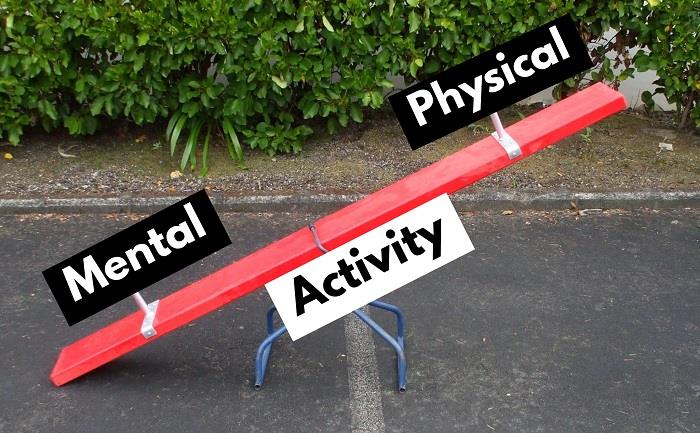“Why is it that, after barely moving all day while at work, I feel too tired to move?”
It is easy to understand why this would be confusing…on the surface, it makes no sense. This was a real question a friend of mine asked me during a recent conversation over dinner.
The answer is surprisingly simple, despite the fact that it might look like a contradiction.
ANSWER: We use our brains too much and our bodies too little.
But this still does not fully explain why we have this feeling of debilitating fatigue despite a mostly inactive day.
Little Physical Activity + Big Cognitive Load = Couch Potato
Contrast ancient human life with modern human life:
| The Olden Days | Today |
| Frequent mental breaks, even when working on mental tasks | Few, if any, mental breaks during the workday |
| Frequent physical activity | Infrequent physical activity |
| Ignorance of events outside your immediate geographical area/tribe | Inescapable exposure to everything going on everywhere in the world, all the time |
Let’s hop in our time machine. Consider the following scenario: You are an ancient human tracking prey on a hunt (or foraging for suitable root veggies or berries to eat, you get the idea.) You run over unpredictable terrain tracking your prey (using your mind and body) for a couple hours, speeding up and slowing down as necessary to stay with the prey as you wait to exhaust it.
Maybe the hunt was successful, maybe it was not (not all of them were.) They were not always successful. Life was hard. Regardless, you sit against the trunk of a tree for a brief rest and your head falls back to rest on the tree. For a few minutes you watch the clouds roll by before you get up to begin preparing the prey for carrying back to your tribe (assuming a successful hunt.)
During this scenario, you were using your body almost constantly. Your brain was getting a lot of work too, but (and this is the important part) on 👉 tasks that were immediately relevant to your experiences in the moment. 👈 Hard to understate the significance of this.
Your mind is focused and brain is working on solving the immediate problems right in front of you directly related to the task at hand (survival). Your brain does not have to deal with uncertainties about your retirement plan (what’s that?), the major repair your car needs (what’s a car?), or fret for the poor pigeon nearly put to death recently by the Australian government. (Yes, it is a real story and no, I am not giving you the link…that would go against the entire point of this article! You can look it up if you must.)
All of this extra input to our brains about things we cannot control happening all around the world create a kind of massive mental background noise that we have a hard time cutting through. Maintaining focus on the task at hand and what matters in the moment with such unrelenting sensory inputs is mentally taxing.
Now it’s back to where we started: When the idea of getting up and moving – to say nothing of exercising – announces itself in your mind, your brain thinks “No way,” because the reason you do not feel like doing it is that it will take even more mental energy to do so. And strictly speaking, in the moment, you do not need to move to survive in modern life.
The idea of moving is tiring enough for your brain that it will not let your body do it. Mental fatigue means your movements will be sloppy and less well-coordinated, potentially dangerous, and you will have compromised reaction time and less awareness of your surroundings.
In kindness to yourself, recognize the challenges presented by life in a world that we live in now. You have a brain designed for the wilderness and you live in a metropolis. Sprinkle regular (and fun, if possible) spurts of movement throughout your day. Give yourself a mental break, move your body, and refresh your mind with the resulting circulation!

